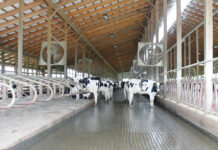SALEM, Ohio — U.S. House Speaker John Boehner, R-Ohio, said he plans to vote for the 2013 farm bill, which is expected to be introduced to the full House later this month.
In a June 10 statement to media, he encouraged a “vigorous and open debate” and commended House Ag Chairman Frank Lucas, R-Okla., for “including a number of positive reforms in this bill,” like the ending of direct payments to farmers and food stamp reform.
But Boehner doesn’t agree with all parts of the bill, especially the part that includes a new dairy safety net (Dairy Security Act), which includes a form of supply management and margin protection for dairy farmers.
“I had concerns about some of the dairy provisions of the farm bill last year, and those concerns remain this year,” he said. “I oppose those provisions and will support efforts on the House floor to change them appropriately.”
In support
In a statement June 12, the speaker confirmed he would vote in favor of the bill.
“I am going to vote for the farm bill to make sure the good work of the (House) Agriculture Committee, and whatever the floor might do to improve this bill, gets to a conference so that we can get the kind of changes that people want in our nutrition programs and our farm programs,” he said.
The Senate approved its version of the bill by a vote of 66-27, the evening of June 10. The bills are very similar, except the House bill calls for about $20 billion in additional cuts to the food stamp program.
Both bills include the Dairy Security Act, something the National Milk Producers Federation said is an important protection for dairy farmers.
“We encourage the House of Representatives to also support its Agriculture Committee-passed bill, and reject any dairy processor-backed amendment to undermine the bill’s effectiveness by removing the market stabilization program,” NMPF CEO Jerry Kozak said in a released statement.
Senate action
For the Senate, it’s the second time in a year senators have approved a farm bill. Last year’s House ag committee approved its version of the bill in July, but it was never considered by the full House, partly over concerns with the Dairy Security Act.
Most of the nation’s major farm organizations support the farm bill passed by the Senate, and are calling for swift action in the House, as well.
Very similar
Bob Stallman, president of the American Farm Bureau Federation, outlined some of the major similarities between the bills:
• Both work to protect crop insurance and offer enhancements through new provisions such as the Supplemental Coverage Option, a program that allows farmers to purchase an area-triggered revenue or yield insurance product to cover the deductible associated with the underlying individual or area insurance policy. The SCO would be available for all programs except for cotton.
• Each bill offers a safety net with options for producers, specifically price-based provisions of particular interest to rice and peanut farmers and revenue-based provisions supported by corn and soybean farmers.
• Both bills maintain the marketing loan program while eliminating direct payments and other Title I farm programs. The savings from the elimination of the direct payments and other programs are used in each bill to fund new farm programs and to provide budget savings to go toward deficit reduction targets.• Both have nearly the same gross margin insurance program for dairy producers.
NFU weighs in
National Farmers Union President Roger Johnson said “it is promising to hear that House leadership is embracing the 2013 farm bill.”
He said the bill makes “significant, much-needed reforms to agriculture programs, including significant deficit reduction. The farm bill also prevents the necessity for emergency ad hoc disaster programs, which almost always represents deficit spending.”
NFU also supports the bill’s elimination of direct payments, saying “American farmers need a safety net in times of natural disaster and long-term price collapse, not when conditions are more favorable.”









